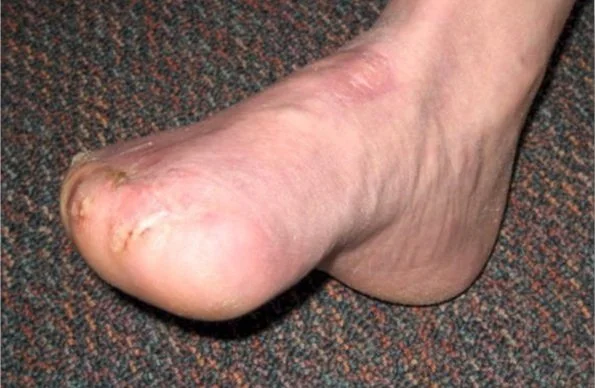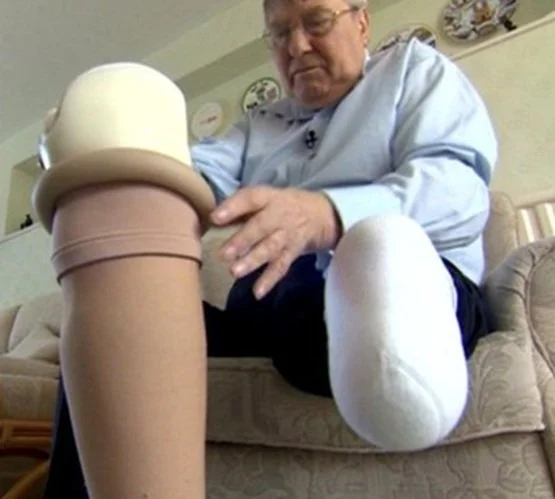What is Neuropathy?
Neuropathy is damage or dysfunction in the peripheral nerves that is commonly caused by diabetes, injury, or exposure to toxins. Symptoms of neuropathy include weakness, numbness or tingling, and severe pain, usually in the hands and feet. Over 20 million people in the U.S. suffer from the painful symptoms caused by neuropathy. That number only accounts for those who have officially been diagnosed with the condition; many people who struggle never receive testing or diagnosis. Neuropathy symptoms can be debilitating. As a result, it can be difficult to cope with the daily demands of life such as walking, typing, or even buttoning a shirt.
Peripheral Neuropathy
-
Peripheral neuropathy is one of the most common forms of neuropathy. It effects the hands, feet, arms, and/or legs.
-
This type of peripheral neuropathy results from damage to the myelin sheath surrounding nerve cells.
-
This type of peripheral neuropathy is caused when damage to the nerves axons occur.
-
Numbness or insensitivity to pain and temperature.
Tingling, burning, or prickling sensations.
Sharp pains or cramps (like walking on sponges).
Extreme sensitivity to even light touch.
Loss of balance and coordination.
*Symptoms often worsen at night*
Diffuse Neuropathy
-
Diffuse means that the symptoms of neuropathy can either be experienced in many parts of the body or it can affect one specific part of the body. Diffuse Neuropathy can be peripheral (effecting the extremities) or autonomic (targeting the internal organs).
-
This condition damages the nerves that serve the heart and other internal organs.
-
urinary incontinence
Lack of sexual function
Digestive issues (stomach emptying slowly, bloating, persistent nausea, vomiting)
Lower bowel problems (constipation or diarrhea)
To prevent progressing symptoms, you need to understand why you experience neuropathy.
It’s like when your check engine light comes on the dashboard of your car; you wonder what is going on. Is it serious and how long can I drive my car before I get stranded?
When your FEET doesn’t feel normal, something is going on down there; this is your dashboard to get it checked. There are natural ways to handle this without medication that does not reverse or help but only with reducing symptoms.
Leading Causes of Neuropathy:
Diabetes
The most common cause of neuropathy. It is created by a weak microbiome. Not absorbing the right amount of foods and not enough of the healthier and too many carbs raise blood sugar.
Trauma or Injury
Falling and or breaking a foot or ankle.
Vitamin Deficiencies
Malnutrition from not eating live food with enzymes
Chemotherapy
Chemo destroys the good bacteria microbiome leading to a lack of nutrition to feed the body, especially the feet.
Medications
Certain antibiotics, antidepressants, and seizure medications can lead to neuropathy.
Alcoholism
Increases insulin-causing Type 2 diabetes affecting feet
Bypass Surgery
Weight loss surgery can lead to a weaker microbiome affecting nerve damage, causing neuropathy symptoms.
Exposure
Exposure to toxic industrial chemicals interferes with the body’s microbiome again malnourishment = neuropathy.
Uncontrolled diabetes (even on medication) results from a poor diet, lack of exercise, and unstable sugar levels. High blood glucose levels (high blood sugar due to diet) harm nerves and blood vessels. When nerves and blood vessels are damaged, circulation to the peripheral areas of the body—the limbs and extremities—is affected. This will lead to diabetic neuropathy, which further damages nerve fibers, causing numbness that leads to injuries and/or infections. Infections, injuries, and foot ulcers are commonly caused by compromised blood circulation. These conditions lead to foot and leg amputations because blood cannot circulate fast enough to heal wounded areas.
The World Health Organization predicts that by 2025, more than 350 million people will have diabetes that will lead to neuropathy.
The leading cause of these symptoms mostly malnutrition.
This means the food you are eating is not fully digesting and assimilating into the blood and cannot heal/ repair your body. The body heals from the head down and the feet are the ones that get the leftover nutrients that are still in the bloodstream to repair the body then the feet. The feet have less blood flow anyway and are very slow to heal and recover from even nicks or sores hence amputation!
For Perspective
The cost of our neuropathy home program is between $85 and $145 a month for the nutritional products on the home and shop page; this is considerably cheaper than the other uncomfortable treatment and after-care options.
-
The cost of each lower limb amputation is between $30,000 and $60,000, with an additional $43,000 to $60,000 in follow-up care!
-
Each year, staying at a nursing home costs up to $80,000! Over the past five years, the median annual cost of private nursing home care has jumped up by 24%. According to Glenworth’s 2013 Cost of Care Survey, prices increased from $67,527 to $83,950! Prices for a semi-private room in an assisted living facility are not much cheaper, though they are a less expensive alternative because they do not offer the same level of care.
-
The cost of an in-home health aide who provides hands on care is $44,000 per year—up 5% from 2019. This balances to about $3,500 a month!






